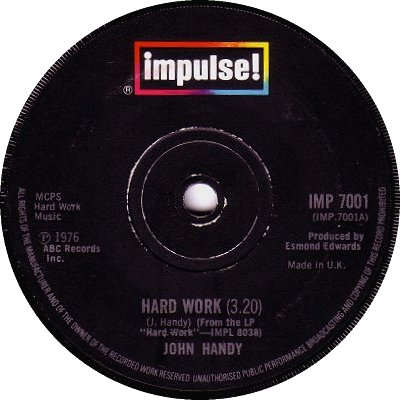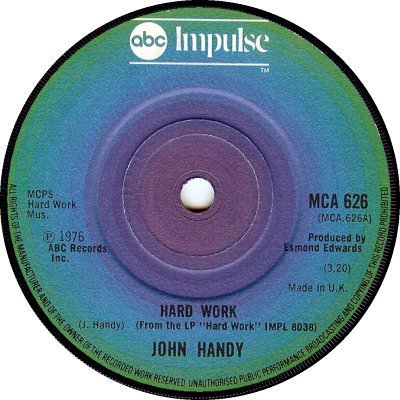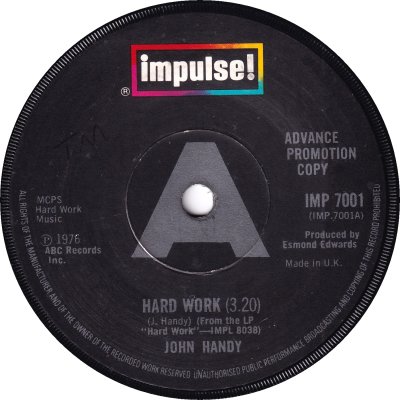


American. The Jazz subsidiary of Am-Par (which became 'ABC-Paramount' at the start of 1962) Impulse received its first mention in 'Billboard' in the issue of the 5th of December 1960, which said that Sam Clark - the head of Am-Par - had decided that it would be best to separate the company's Jazz product from its Pop product. Producer Creed Taylor, who had handled Am-Par's Jazz repertoire since its inception, was going to be in charge of the new label, Impulse; it was intended to feature just Modern Jazz artists, with no Trad Jazz or reissued material. An advert for the first four Impulse LPs appeared in 'BB' of the 6th of February 1961, and the first single, 'One Mint Julep' by Ray Charles, followed in March ('BB', 6th March). Taylor left Impulse before too long and became head of Verve Records; 'BB' of the 9th of October reported that Bob Thiele, who had previously been with Coral, Dot and Roulette, was expected to become the new head of A&R shortly, and he duly did so.
Impulse settled down into its groove as an uncompromising Jazz line, with the likes of John Coltrane, Sonny Rollins and Archie Shepp on its books. There was the occasional attempt to widen its appeal: 'BB' of the 24th of July 1965 reported that the label was making an attempt to diversify its 'hard jazz' catalogue by encouraging some of its artists - those whose styles suggested that they could make the change - to record more Pop-friendly material. After producing many of Impulse's records and playing a major role in developing the label, Thiele formed his own production company, Flying Dutchman Records, in 1968; it was soon signed up to produce exclusively for Impulse ('BB', 14th December 1968). His place at the helm was taken by Ed Michel. 'BB' of the 23rd of August 1969 revealed that Michel was attempting to introduce a 'more commercial' sound to the label, and that Impulse's stable of hard Bop and avant-garde artists were experimenting outside those forms.
At the start of the '70s Pharaoh Sanders was Impulse's hottest seller; among the other fifteen artists at the label were John Coltrane, Alice Coltrane and Ahmed Jamal. ('BB', 25th July 1970). ABC seems to have become somewhat coy about Jazz at that time: 'BB' of the 12th of September said that it was trying to give Impulse a non-Jazz image by eliminating the word from its album sleeves in favour of the phrase 'University Series Of Fine Recordings'. In addition the sleeves were to be given a 'more contemporary' look. Recording activity appears to have slowed down; according to 'BB' of the 23rd of June 1973 half of Impulse's issues at that point consisted of repackaged material. Later that year 'BB' of the 22nd of September reported on another effort to put Impulse before a wider market: there were to be tours by some of its artists, radio spots were being secured in which to advertize LPs, and three new singles were being released, the first since 1971. Then twelve months or so later, John Rosica - vice president and general manager of ABC / Impulse - introduced a new merchandising / promotional / marketing / advertizing approach in a further attempt to spread the word about Impulse.
By the summer of 1975 Michel had gone, Esmond Edwards replacing him. 'BB' of the 2nd of August observed that Impulse had found its own niche in avant-garde and 'spiritually ethereal' music, and the issue of the 16th of August added that, after a quiet past few months, Impulse was gearing up again. The roster had been pared somewhat but new signings were in the offing and there was an ambitious schedule of album releases lined up for the autumn. Current Impulse artists included Gato Barbieri and Keith Jarrett. The revival had something of an effect, but apparently not enough of a one. A couple of years later 'BB' of the 11th of June 1977 broke the news that Edwards's contract had not been renewed. The following week's issue (18th June) commented that his departure had come despite Impulse under his direction having just had its best ever year, and wondered if ABC was putting Jazz on the back burner. That turned out to be the case, at least as far as new recordings were concerned. 'BB' of the 12th of December 1977 revealed that ABC was cutting back severely on the number of its LP releases as a whole, and the vast majority of Impulse releases of 1978 were repackagings of old tracks. Early in 1979 ABC was purchased by MCA; Impulse was included in the deal, but was more or less shelved after the move. It was however revived by MCA in 1982, for reissues, and a proper revival followed in 1985, by which time it had passed far beyond the scope of this site.
Impulse came on the scene relatively recently in Britain. Until the middle of 1968 its records were released on EMI's Stateside label, as were those of parent company ABC. Then 'Record Retailer' of the 1st of May told its readers that EMI would be launching Impulse as a label in its own right the following month, beginning with a batch of six LPs. Unlike its counterpart in the States it was almost entirely an album label here, and it ventured into the 7" market only once. John Handy's 'Hard Work' b/w 'Young Enough To Dream' (IMP-7001; 7/76) was issued after ABC had moved from EMI, taking Impulse with it, and had struck up a mutual marketing deal with Anchor Records. Promo copies were marked in the usual ABC / Anchor family style (3). Manufacture and distribution were by CBS. The single proved popular enough to merit reissuing in 1982, on the ABC / Impulse label, through MCA, by which time the label design had changed (2). Thanks to Robert Bowes for the scan of the 1982 issue, which is included primarily for the sake of interest but also because it has a potentially misleading '1976' on it.


Copyright 2006 Robert Lyons.

